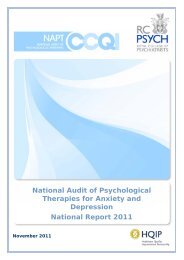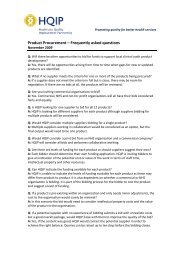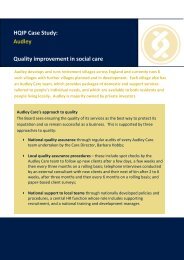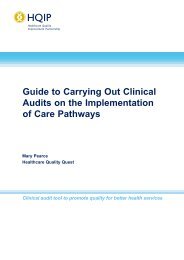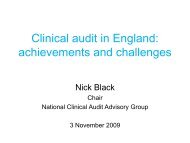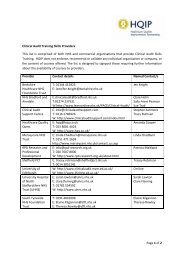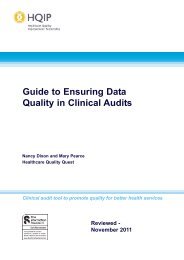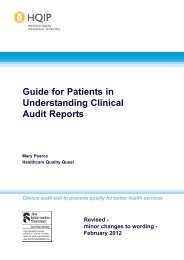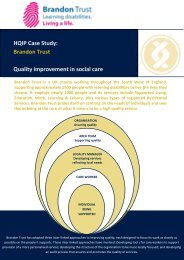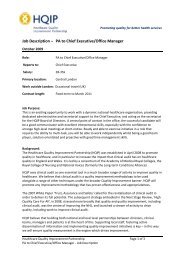Good Governance Handbook - HQIP
Good Governance Handbook - HQIP
Good Governance Handbook - HQIP
Create successful ePaper yourself
Turn your PDF publications into a flip-book with our unique Google optimized e-Paper software.
In Principle 8 (board supports) we identified the importance of clarity in roles and<br />
relationships in particular for the Chair CEO, Board Secretary, Exec and NEDs, the SID<br />
and in FTs and some commissioning organisations the role of governors or members.<br />
In addition to the formal role it is also important to consider the mix of board<br />
directors.<br />
Board members demonstrate individual characteristics, experiences and skills. The<br />
board needs a range of competences and should be aware of its strengths and<br />
weaknesses. Boards may invite who they wish to support them and may find it useful<br />
to recognise any gaps and fill these on an ad-hoc basis by inviting non-voting<br />
colleagues to join the for specific meetings or agenda items.<br />
Julia Unwin, Chief Executive of the Joseph Rowntree Foundation, has identified a<br />
number of different roles, and these all pose different challenges 37 : “I have seen<br />
boards that are entirely entrepreneurial and they are pretty scary. I have also seen<br />
boards that are entirely compliance driven, and they are terrifying.”<br />
• Peacemaker - can’t we find a common way?<br />
• Challenger - can’t we do better? Is it just because it has always been done this<br />
way?<br />
• History holder - we need to go back to our roots, and remember what worked<br />
in the past.<br />
• Compliance queen - always says, “can we do this? What will the auditors say?<br />
Is this legal?”<br />
• Passionate advocate - will respond, “surely we must take a risk, we must do<br />
more”.<br />
• Data champion - all the evidence shows that however often we do that, it<br />
makes no difference to the outcomes.<br />
• Wise counsellor - says, “we are not the only people trying to tackle this issue,<br />
we need to think carefully, plan properly, and take this step by step”.<br />
• Inspiring leader - will describe his/ her vision, will enthuse and excite.<br />
• Fixer - says “I think we can get together later and sort this out”.<br />
• Risk taker - says, “the crisis is simply too great. Let’s just spend the money, the<br />
funds will flood in”.<br />
• Strategist - says, “we need to think beyond 2012, and then our position will be<br />
much stronger and the whole environment will be different”.<br />
• User champion - says, “I am worried that we are ignoring the interests of our<br />
users. We haven’t mentioned their needs all through this meeting”.<br />
The role of risk taker is often missing form public sector boards who should consider<br />
how they can achieve this valuable input.<br />
6.7 Constructive challenge<br />
37 Julia Unwin, Address to the Charity Trustee Network, November 2007<br />
www.good-governance.org.uk 28



